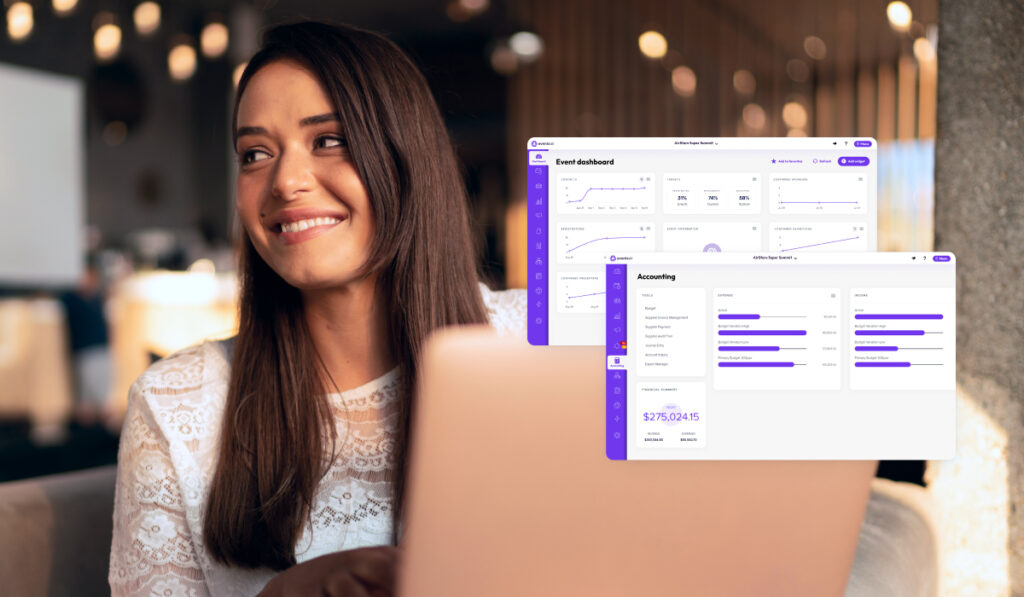Event Integrations: An Ultimate Guide for Event Planners

Every successful event shares a common goal – delivering an engaging and unforgettable experience for attendees.
Participants rarely consider the behind-the-scenes operations that make an event run smoothly. They expect easy registration, real-time updates, and seamless interactions on the day. What they don’t see is the complex web of systems working together to make that possible.
For event planners, the challenge is ensuring that data flows effortlessly between platforms, without spending countless hours on manual admin. When attendee details, payments, schedules, and communications are scattered across different platforms, inefficiencies arise. Mistakes happen. Frustration builds.
That’s why event integrations have become essential. They ensure real-time data synchronization, eliminate the need for duplicate data entry, and provide a more connected experience for both planners and attendees.
In this guide, we’ll break down:
- The role of integrations in event management
- The must-have integrations for event planners
- Emerging trends shaping the future of event technology
- How to choose the right integration approach
Firstly, what are event integrations?
At their core, event integrations are connections between different software systems, allowing them to share data and automate processes. Instead of manually exporting and importing attendee lists, updating financial records, or syncing marketing lists, integrations ensure everything updates in real time.
For example, consider a professional association that uses Salesforce to manage its members. If they also use EventsAir for event registrations, an integration between the two ensures that any member updates, ticket purchases, or attendance history are automatically reflected in both systems. This prevents outdated information, duplicate entries, and the risk of errors.
Without integrations, event planners spend hours manually moving data between systems, leading to inconsistencies and frustration. With integrations, they can focus on delivering an outstanding event experience.
Essential event integrations for a connected event experience
When building or selecting your event management platform, here are some of the fundamental (and critical) must have integrations that should keep your events humming:
1. CRM and membership system integrations
One of the most critical integrations for professional event planners is connecting their event platform with their CRM. Whether using Salesforce, HubSpot, or Dynamics 365, integrating attendee data ensures seamless communication, accurate reporting, and better audience segmentation.
For membership-based organizations, integrating with a membership database means that members automatically receive special pricing, appropriate content, and relevant updates without requiring additional manual effort.
2. Payment and financial management integrations
Managing event revenue is smoother when payments are processed securely and automatically linked to financial records. Integrating with payment gateways ensures:
- Seamless ticket sales and registration payments
- Automatic invoice generation
- Real-time revenue tracking
Further, syncing with accounting software like Xero or QuickBooks allows planners to manage budgets efficiently, ensuring every expense and transaction is accounted for.
3. Marketing and communications tools
Timely communication is key to attendee engagement. So, integrating event platforms with tools like Marketo, MailChimp, or ActiveCampaign enables:
- Automated event confirmations and reminders
- Targeted email campaigns for segmented audiences
- Post-event follow-ups and feedback collection
Instead of exporting lists and manually sending emails, event planners can automate personalized messaging based on attendee behavior and preferences.
4. Onsite check-in and access control
First impressions count, and a smooth check-in process sets the tone for the event. Integrating attendee registration with badge printing, QR scanning, and RFID systems enables fast and hassle-free event entry.
With real-time data syncing, planners can track attendance, manage access to VIP areas, and gain insights into attendee flow throughout the event.
Emerging trends in event integrations
Event technology is evolving rapidly, and forward-thinking planners are already leveraging next-generation integrations to enhance their events.
AI-powered personalization
Artificial intelligence is reshaping attendee engagement. AI-driven integrations analyze attendee behavior and preferences, enabling features like:
- Smart session recommendations based on interests
- AI chatbots for real-time event support
- Predictive analytics to optimize event planning
Hybrid and virtual event integrations
With hybrid and virtual events now a standard part of the industry, seamless integration with Zoom, Microsoft Teams, and Go-To Webinar ensures a cohesive experience for in-person and remote attendees.
Beyond streaming, these integrations allow for real-time audience engagement, interactive polling, and networking features that bridge the gap between physical and virtual event spaces.
But, if your event management software already includes comprehensive hybrid and virtual solutions that natively connect and synchronize with your platform, then this is ideal. With EventsAir, everything is in one place, ensuring a seamless experience for attendees and organizers alike.
Sustainability and compliance tracking
As sustainability becomes a priority, event organizers are integrating carbon footprint tracking tools to measure and reduce environmental impact. Simultaneously, GDPR-compliant data integrations ensure attendee information is handled securely and ethically (our in-built GDPR toolkit is great for this!).
Choosing the right event integration approach
When considering event integrations, planners have two main options:
1. Pre-built integrations (for fast, hassle-free integrations)
Pre-configured integrations, provide plug-and-play functionality, instantly linking event management systems with other popular software such as CRMs, marketing platforms, and payment processors.
For event teams who need seamless, IT-free integrations, EventsAir’s Smart Connectors offer a simple, reliable solution that are continuously monitored and updated.
2. Open API & Enterprise API (for custom or large-scale needs)
For organizations with complex workflows or high data volumes, an Open API allows custom-built integrations tailored to specific needs.
For large enterprises requiring near real-time synchronization, an Enterprise API delivers advanced capabilities, ensuring high performance and compliance with security standards.
The future of event integrations
The right integrations don’t just simplify event management, they elevate the attendee experience. By ensuring systems work together seamlessly, event planners can focus on what truly matters: creating engaging, memorable events.
At EventsAir, we provide a range of flexible Smart Connectors, Open API solutions, and Enterprise API capabilities to meet the unique integration needs of event professionals.
Looking to optimize your event tech stack? Explore our integration solutions and discover how easy it is to keep your systems connected. Book your demo of EventsAir today.



